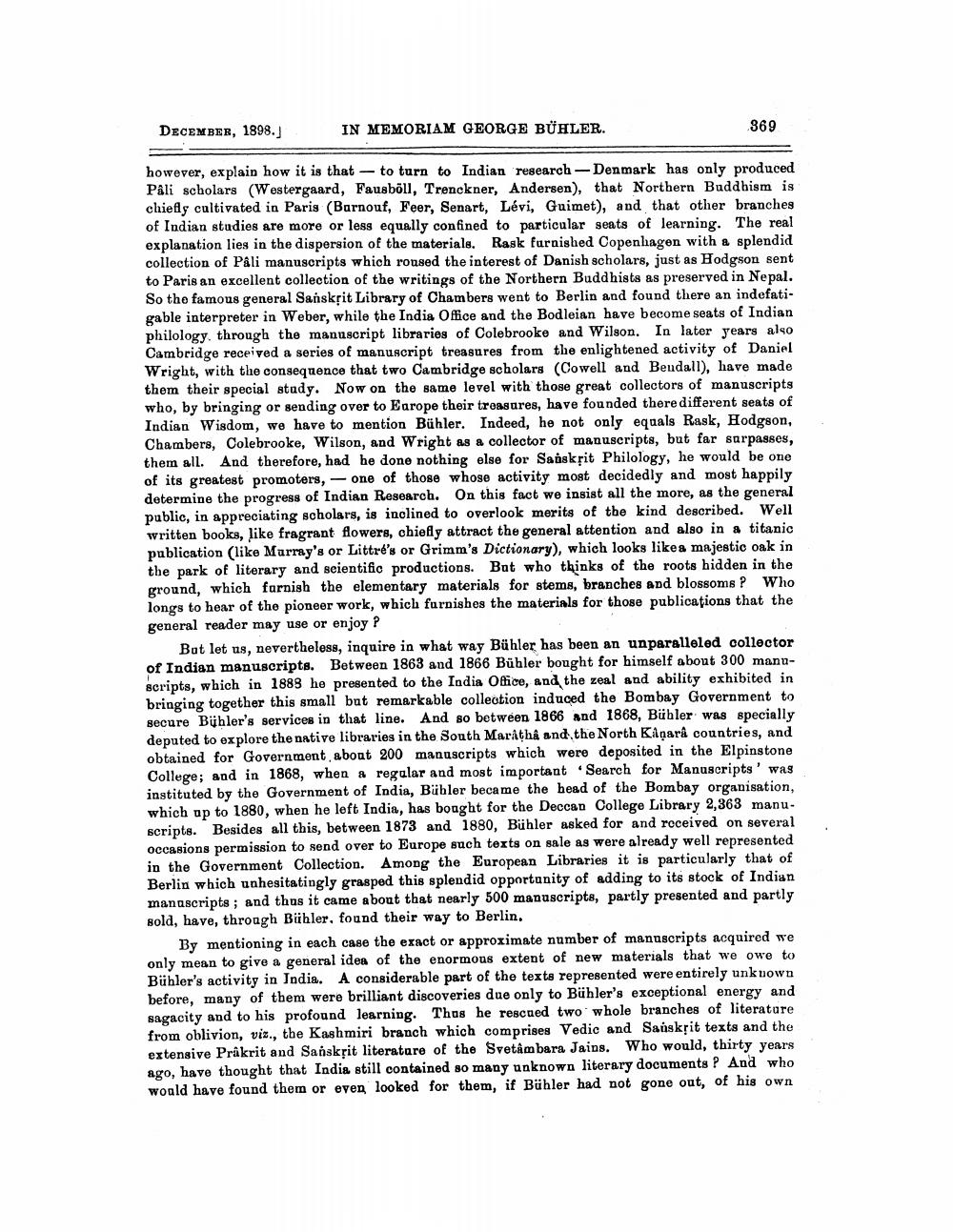________________
DECEMBER, 1898.]
IN MEMORIAM GEORGE BÜHLER.
369
however, explain how it is that – to turn to Indian research - Denmark has only produced Pali scholars (Westergaard, Fausboll, Trenckner, Andersen), that Northern Buddhism is chiefly cultivated in Paris (Barnouf, Feer, Senart, Lévi, Guimet), and that other branches of Indian studies are more or less equally confined to particular seats of learning. The real explanation lies in the dispersion of the materials. Rask furnished Copenhagen with a splendid collection of PAli manuscripts which roused the interest of Danish scholars, just as Hodgson sent to Paris an excellent collection of the writings of the Northern Buddhists as preserved in Nepal. So the famous general Sanskrit Library of Chambers went to Berlin and found there an indefatigable interpreter in Weber, while the India Office and the Bodleian have become seats of Indian philology, through the manuscript libraries of Colebrooke and Wilson. In later years also Cambridge received a series of manuscript treasures from the enlightened activity of Daniel Wright, with the consequence that two Cambridge scholars (Cowell and Beudall), have made them their special study. Now on the same level with those great collectors of manuscripts who, by bringing or sending over to Earope their treasures, have founded there different seats of Indian Wisdom, we have to mention Bühler. Indeed, he not only equals Rask, Hodgson, Chambers, Colebrooke, Wilson, and Wright as a collector of manuscripts, but far sorpasses, them all. And therefore, had he done nothing else for Sanskrit Philology, he would be one of its greatest promoters, - one of those whose activity most decidedly and most happily determine the progress of Indian Research. On this fact we insist all the more, as the general public, in appreciating scholars, is inclined to overlook merits of the kind described. Well written books, like fragrant Aowers, chiefly attract the general attention and also in a titanic publication (like Murray's or Littré's or Grimm's Dictionary), which looks like a majestic oak in the park of literary and seientific productions. But who thinks of the roots hidden in the ground, which farnish the elementary materials for stems, branches and blossoms ? Who longs to hear of the pioneer work, which furnishes the materials for those publications that the general reader may use or enjoy ?
But let us, nevertheless, inquire in what way Bühler has been an unparalleled collector of Indian manuscripts. Between 1863 and 1866 Bühler bought for himself about 300 manuscripts, which in 1883 he presented to the India Office, and the zeal and ability exhibited in bringing together this small bat remarkable colleotion induced the Bombay Government to secure Bühler's services in that line. And so between 1866 and 1868, Bübler was specially deputed to explore the native libraries in the South Maratha and the North Kaşarà countries, and obtained for Government about 200 manuscripts which were deposited in the Elpinstone College; and in 1868, when a regular and most important Search for Manuscripts' was instituted by the Government of India, Bühler became the head of the Bombay organisation, which op to 1880, when he left India, has bought for the Deccan College Library 2,363 manuscripts. Besides all this, between 1873 and 1880, Bühler asked for and received on several occasions permission to send over to Europe such texts on sale as were already well represented in the Government Collection. Among the European Libraries it is particularly that of Berlin which unhesitatingly grasped this splendid opportunity of adding to its stock of Indian manuscripts; and thus it came about that nearly 500 manuscripts, partly presented and partly sold, have, through Bühler, found their way to Berlin.
By mentioning in each case the exact or approximate number of manuscripts acquired we only mean to give a general idea of the enormous extent of new materials that we owe to Bühler's activity in India. A considerable part of the texts represented were entirely unknown before, many of them were brilliant discoveries due only to Bühler's exceptional energy and sagacity and to his profound learning. Thas he rescued two whole branches of literature from oblivion, viz., the Kashmiri branch which comprises Vedic and Sauskpit texts and the extensive Prakrit and Sanskrit literature of the Svetâmbara Jains. Who would, thirty years ago, have thought that India still contained so many unknown literary documents P And who would have found them or even looked for them, if Bühler had not gone out, of his own




